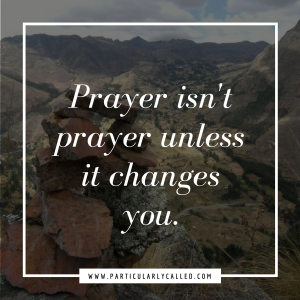It is only fitting to begin a post on building a strong prayer life with a prayer.
Hello Lord,
I’m here. I want to spend the next few moments with you so you can teach me how to pray. Open my heart to receive you in this moment and bring me close to you. I want to love you, Lord. I want to deepen my relationship with you. I want to experience a desire for you like I have never experienced before. Teach me to pray. Teach me to pray like you prayed. Teach me what it is like for prayer to be breath and life, strength and sustenance, courage and rest. Teach me to seek prayer before and above all else. Lord, teach me to pray.
Marks of a strong prayer life – “The Goal”
- Prayer is natural and “constant” – a normal part of every day life
- You relate to God as all powerful and to be respected, but also as approachable, loving, and loveable (like any good father)
- Prayer is first priority over all other pursuits – You have set aside special times to pray and that time is sacred
- Your prayer style is diverse and abundant – you do not feel confined to one particular routine – you know how to and are comfortable with using different types of prayer and prayer postures to enhance your prayer life
But, in case you aren’t there yet…
What do I do if my prayer life is weak?
- Ask yourself what is holding you back?? (Are you afraid?, Are you closed minded to different approaches to prayer?, etc…)
- Ask yourself if you really want a strong prayer life. It requires sacrifice to build anything of value. Are you sabotaging yourself by not making time for prayer or by not making God a true priority in your life
- Try new postures in your prayer (Read also: How to Pray from the Heart – The impact of Prayer Posture on your Prayer Life)
- Try asking God to help you pray (Read also: How to use the Our Father to teach us HOW TO PRAY and WHAT TO PRAY FOR)
- Try new types of prayer (the main topic of this article) – Ex. if you have been hesitant to try scripted or ritualistic prayer in the past then maybe you need to broaden your horizons, if you fear entering the realm of contemplative or spontaneous prayer – then maybe that is where you should venture next.
Types of Prayer – (Examples, Value, Purpose, “How to”…)
1 – Scripted prayer and ritual
Examples of scripted prayer
The Our Father. The Serenity Prayer. Grace before meals. Morning offerings. “Now I lay me down to sleep…”. Liturgy of the Hours. Catholic Mass. The Rosary. Chaplets and Novenas. All the prayers in prayer books, prayer cards and all over Pinterest.
Click Here to listen to a Podcast reflection on the Our Father as Traditional Scripted Prayer
The value of scripted prayer for a strong prayer life
- Helps you find words
This kind of prayer might also be considered “Beginner prayer” in many ways. It makes it very obvious and explicit as to what we should say and (sometimes) how we should say it. This can be very helpful to someone who “just doesn’t know what to say” when they pray, or to someone who struggles in general with the idea of talking to God.
In many ways it is like cooking with a recipe. The words are there to guide us. They are not there to lock us in, but to help us prioritize, to teach us what ratios to use, and what to do first if we aren’t comfortable with the process yet.
- Builds a sense of unity with other Christians saying the same prayer (common intentions, common goals, etc)
- The repetition provides a sense of peace and relaxation – allowing the prayer to become a sort of background music to a deeper prayer of contemplation that transcends the words. (More on this in the section on Contemplative prayer)
How to get the most out of scripted prayer
Some people worry that, in using scripted prayer, their prayer can become routine and “meaningless” – That they will begin to “babble like the pagans” (Matthew 6:7)
This can be true if you don’t actually pray when you are reciting the words. BUT – this is a problem with the person praying, but not the prayer itself.
Here are a few ways to avoid this pitfall when taking advantage of scripted prayer
- Contemplate the significance / origin of the prayer
- Contemplate the value of the actual words themselves
- Contemplate the purpose of the prayer – engage with it on a deeper intellectual level – don’t be afraid to ask questions about it and contemplate those answers
Are there any other pitfalls to scripted prayer?
- Using it as an excuse not to really pray (“pretend prayer” – rattling off words quickly to “get it over with”)
- Exclusive reliance on it – never deviating to personal / spontaneous prayer – How deep can your prayer life be if you only ever use someone else’s words to talk to the person that you claim to love??
If you are falling into either of these categories, you may want to readjust your approach to scripted prayer.
The purpose of rite/ritual type prayer (in addition to all of the above)
For Example: Catholic Mass and different sacraments (Catholic or Protestant)- ie. baptisms, funerals, weddings, etc.
Rituals are designed to commemorate only the most important of events. They are often our most powerful link to our traditions and our history as a way of highlighting the different areas in which it is most important for Christians to be unified. The fact that a ritual exists should not be an annoyance or seen as a hindrance of “freedom”, but rather lead us to a deeper contemplation of its original significance.
2 – Contemplative prayer
Examples of contemplative prayer
- Reading and reflection on the Scriptures (ex. How is God trying to show me more of Himself in this passage? What impact does this have on my life?)
- Reflection on other spiritual readings (ex. What does it mean for my life? What can I learn from this? What is God trying to teach me through this?)
- Reflection on daily life – Ex. recognition of favors from God, learning from trials and experiencing opportunities for personal and spiritual growth as gifts from Him, recognize our faults and prepare to make restitution for them
The role of contemplative prayer in a strong prayer life
If you need something tangible to really spur your spiritual growth, this (plus humility) is what does it, hands down! Contemplative prayer is by far the most important aspect of prayer to master as soon as possible. It is how you build a strong foundation for your prayer life. It helps you get to know God better. It is how you get to know yourself truly, and your plan in His grand design. This is where prayer begins to CHANGE us.

How to get the most out of contemplative prayer
- Ask the Holy Spirit for guidance before, during and after each time of prayer – recognize his presence and wisdom as critical to a fruitful prayer experience
- Make it a regular and habitual practice, something to look forward to. Strengthen your muscles in this area (Read: Spiritual Fitness). The exact frequency (ie. every day at 1pm) isn’t as important as making the effort to make it common. You will begin to notice yourself craving this time with God. The more you do it, the more you start to love it and recognize how much you need it – but, you have to make the first effort to get in the habit.
- Prioritize this time – try to avoid interruption, find and MAKE room for quiet time with God (Read also: How to Give God the Gift of your Presence)
- Be humble. This area of prayer often makes us more aware of our imperfections. This should not be a cause of fear, or worry, or frustration for us, but rather an opportunity for growth. This point is also extremely important because pride often makes us approach prayer with an attitude of thinking we know what we should or will get out if it. If we do this we are no longer truly open to what God actually wants to give us/reveal to us in that time and, therefore, we are rarely able to receive it. Read also: Cultivating a love of Quiet
3 – Spontaneous prayer
Examples of spontaneous prayer
This is the type of prayer that springs directly from the heart. It can be the opening prayer to a bible study, a personal prayer for or over someone, or a simple grace before meals that you made up, or a myriad of other things… But, my FAVORITE aspect of this prayer is that it is “no holds barred” prayer – it is begging, pleading, crying, laughing, worrying, wondering, hoping, dreaming, laying everything at the feet of our Lord, prayer. It can be awkward or passionate, philosophical or simple. The key is that it must be between us and God. Even if other people see it or hear it, it doesn’t matter because it meant to be a private conversation between God and the person praying (Matthew 6:6).
Spontaneous prayer can be done in public or private. It can be spoken (in any language, including toungues, written (for example, see Prayer Journaling), sung, yelled, laughed, cried, or simply remain in your heart or mind. It can express any emotion: joy, sadness, worry, surprise, hurt, all of it. It is unscripted and unprompted and based purely on the inspiration of the moment.
Value of Spontaneous prayer for a strong prayer life
Your comfort level with Spontaneous prayer is how you can best gauge the depth of your relationship with God. What does your spontaneous prayer look like? How awkward is it? What is it about? The answers to these questions should be a pretty good indication of where you are and what you need to improve on.
Impact of Spontaneous prayer
Makes our prayer life highly and intensely personal. Keeps it vivid and alive.
Do you struggle with spontaneous prayer?
Best ways to build confidence in spontaneous prayer:
- Start with scripted prayers. They are good to help you with prayer structure and potential words to use. Try a variety of options until you start to find your style and how He speaks to you the most deeply.
- Prayer journaling is also a really good option. It is safe and private and helps you slow down your thoughts. Read my article on that here: How to use a Prayer Journal to listen to God
Other ways to build a strong prayer life into your everyday
- Talk to Him about what you read. Ask His opinion on whatever you want in fact! You might be surprised by His response!
- Incorporate Christian/Praise and Worship music into your daily life. Music is encouragement to pray. It is easier sometimes to lift up your heart in song, especially when you allow your whole self to get “caught up in it”. It has been said that “when we sing we pray twice” – once in the words we say and once with the fact that singing requires a new level of heart and vulnerability, our whole soul, if you will.
- Make your day a prayer (begin and end with prayer + offer all your works, sorrows, worries, joys, and successes back to Him as they occur)
- Invite God into your mess. Accept your imperfections. Recognize that He wants you just as you are (imperfections and all)! Offer Him your brokenness and everything that comes with it – after all that’s all you have to offer.
- Renew your surrender to him in every moment
Still worried?
Remember, God blesses effort. The more you try, the more you you will be rewarded and begin seeing results from your prayer. Just do your best and try to remain consistent. Work out those spiritual muscles ’til you can really feel them 🙂
Comment below if there is anything I can help you with and click the “Prayer” tag for more related articles, help and resources.
[mailerlite_form form_id=1]




